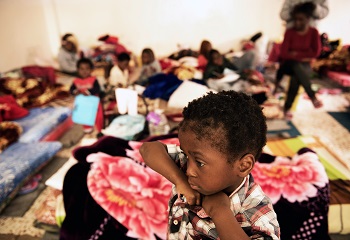UNICEF and UNHCR welcome EU policy to protect migrant and refugee children
UNICEF and UNHCR welcome a new policy guidance from the European Commission as an important milestone for the protection of migrant and refugee children on Apr 12.
“It is the first EU policy to address the situation and rights of all children in migration – refugee and migrant children, children alone and with their families - linking migration, asylum and child protection,” Noala Skinner, Director of UNICEF’s Brussels Office said.

A child stands in a room where women and children sleep on old mattresses laid on the floor at a detention centre in Libya, Sunday 29 January 2017.
“These important guidelines will help EU States better respond to the needs of refugee and migrant children. We strongly hope that these guidelines will contribute, in a very concrete manner, to the protection of the many children who arrive to Europe after having been forced to flee their homes due to violence, war and conflict. Many have suffered incredible hardship while on their journey and afterwards,” said Diane Goodman, Deputy Director of UNHCR’s Europe Bureau.
Key concrete actions include appointment of guardians for children, boosting child protection at all levels as well as in hotspots, better data collection to ensure that children are properly tracked, adopting a comprehensive approach to identifying durable solutions, as well as better monitoring and co-operation among States.
We welcome the call made by the European Commission to Member States to prioritise EU and national funding for children, to refrain from unnecessary and invasive age assessments and to increase resettlement and other legal pathways for children to safely reach Europe. The commitment by the European Commission to invest in child protection training, guidance and tools is another positive development, which will help ensure that children’s best interests are properly assessed in all decisions that concern them.
UNHCR and UNICEF said the Commission’s call to Member States to do everything possible to ensure that alternatives to detention are available and accessible for children and families is encouraging. Both agencies stressed that detention is never in the best interests of children and is extremely detrimental to their health and well-being. Children should not be detained for immigration related purposes, irrespective of their legal or migratory status or of their parents.
The protection of children must start by addressing key drivers of child migration, including violence and protracted conflict, forced displacement, child poverty and deprivation. UNICEF and UNHCR also welcome the EU’s policy commitment to prioritise and support national child protection systems for children displaced or uprooted beyond European borders.
UNHCR and UNICEF look forward to Member States and EU actors putting this plan into action and supporting States to protect children every step of the way and end the terrible exploitation and abuse of children.
Source:United Nations Children's Fund
- 250 reads
Human Rights
Ringing FOWPAL’s Peace Bell for the World:Nobel Peace Prize Laureates’ Visions and Actions

Protecting the World’s Cultural Diversity for a Sustainable Future

The Peace Bell Resonates at the 27th Eurasian Economic Summit

Declaration of World Day of the Power of Hope Endorsed by People in 158 Nations

Puppet Show I International Friendship Day 2020

